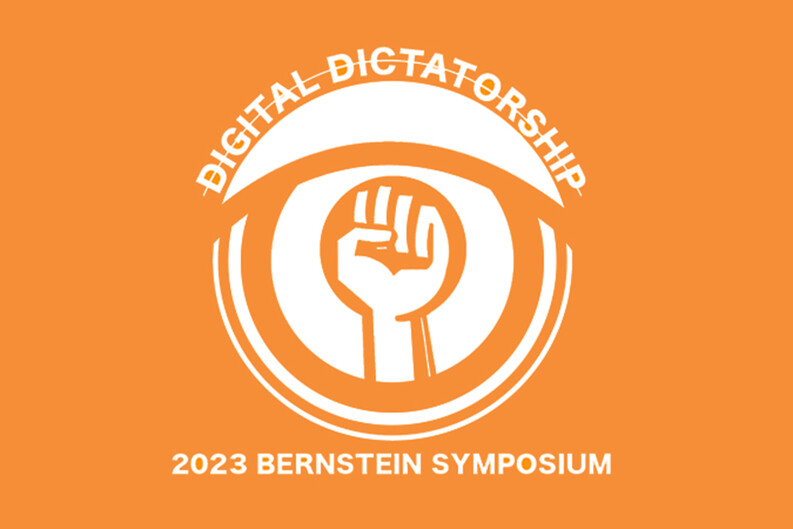Bernstein Symposium Examines “Digital Dictatorship” in China and Beyond

Bringing together human rights scholars, practitioners, and students, the 2023 Robert L. Bernstein Symposium examined the Chinese government’s use of new technologies to create a surveillance society. “Digital Dictatorship: China’s 21st Century Authoritarianism” considered the implications of having the state monitor and record even the most routine activities of life.
“The increasing use of effectively invisible technology by China and other states to gather intelligence about their own citizens and to disrupt and distort politics and civil society is a new challenge to efforts to enable people to exercise their basic human rights,” said James Silk ’89, Binger Clinical Professor of Human Rights at Yale Law School.
Silk said that new forms of surveillance are an especially relevant topic for the Bernstein Symposium, given the interests of its namesake. Robert Bernstein, who supported many human rights causes, was a board member of Human Rights in China.
“Like the other great 21st century threats to global human rights and well-being, climate change and wealth inequality, combatting [digital surveillance by the state] requires new conversations, new expertise, new resources, and new ideas,” Silk said. “Particularly given Bob Bernstein’s deep commitment to human rights in China, we wanted this year’s symposium to contribute to this urgent response.”
“[A] new wave of digital technology, including Big Data, AI, and mobile networks, are empowering rulers to have unprecedented control over society in every iteration.”
— Xiao Qiang
Orville Schell III, the Arthur Ross Director of the Center on U.S.-China Relations at Asia Society, moderated the symposium’s opening conversation between Xiao Qiang, Director and Research Scientist of the Counter-Power Lab at the UC Berkeley School of Information, and Muyi Xiao, a China reporter on the Visual Investigations team at The New York Times.
Schell opened the symposium on April 13, with a question: Is China’s use of digital surveillance is an unprecedented phenomenon, or merely a continuation of long-standing forms of social control?
“Do you think what we’re confronting is new or a reoccurrence of something you’re historically familiar with?” Schell asked.
Qiang said that in the 1990s, technology served as a beacon of hope in China, suggesting the possibility of individual empowerment, information flow, freedom of expression, and even collective action. However, in recent years, the Chinese government dashed people’s hopes of digital technology as a liberating force. Instead, “a new wave of digital technology, including Big Data, AI, and mobile networks, are empowering rulers to have unprecedented control over society in every iteration,” he said.
While technology itself is neutral and has the potential to do good, China has ultimately used surveillance technology to advance anti-democratic ends, panelists said. Qiang noted that AI can be used for surveillance, censorship, and the manipulation of human behavior. He evoked China’s leader, Xi Jinping.
“Xi’s mission is to keep the Chinese Communist Party in power permanently,” Qiang said. “When in the hands of a dictator or authoritarian regime, AI creates the conditions for what we now call digital totalitarianism.”
Panelists noted that, in addition to raising the stakes of protest, China’s use of surveillance has also diminished people’s ability to connect with each other and maintain their sense of community, which remain essential to countervailing efforts for a more liberal society.
“All of the musculature of friends, contacts, relationships, and institutional connections that you built up over the decades have begun to atrophy,” Schell said. “We are losing that fund of common purpose.”
Despite the state’s increasing control, a new space may be emerging for people to challenge digital authoritarianism, panelists said.
“Xi seems like a conqueror of the moment, but his time may be really short-lived,” Qiang said. “Millions of censors are employed in China to suppress even remote dissent. That’s a sign of fear and insecurity. How long is that going to last?”
Discussions about the durability of China’s surveillance society continued throughout the next day’s panels. The first of the events on April 14, “China’s Digital Dictatorship,” featured Maya Wang, Associate Director of the Asia Division at Human Rights Watch; Lü Pin, Founder of Feminist Voices and Ph.D. candidate in gender and politics at Rutgers University; and Ho-Fung Hung, Henry M. and Elizabeth P. Wiesenfeld Professor in Political Economy at Johns Hopkins University. Together, the panelists examined how China’s surveillance has exacerbated long-standing areas of social unrest in the country.
Following the morning panel, the symposium turned beyond China to examine the spread of digital dictatorship across the globe. The panel featured four speakers: Chinmayi Arun, Research Scholar in Law and Executive Director at the Information Society Project at Yale Law School; Olufunmilayo B. Arewa, Shusterman Professor of Business & Transactional Law at the Temple University Beasley School of Law; Steven Feldstein, Senior Fellow at the Carnegie International Endowment for Peace; and Angeli Datt, Research and Advocacy Lead on China at PEN America.
The panel “Transnational Dimensions of Digital Dictatorship” explored topics beyond China’s borders, including how private companies in democratic nations like the United States have joined China in exporting surveillance and other social control technologies abroad.
“I was glad to be able to speak at Yale about the growing threat of transnational repression towards Chinese international students, including the threat to Yale students, and offer recommendations to university administrators on how to respond,” Datt said.
The day’s third and final panel, “Resisting Digital Dictatorship,” looked to the potential for civilian mobilization against China’s surveillance state. Nathan Law, an author, activist and Hong Kong democratic movement leader; Michael Posner, Jerome Kohlberg Professor of Ethics and Finance and Director of the Center for Business and Human Rights at the NYU Stern School of Business; Xiao Qiang, Research Scientist, Berkeley School of Information; and Nate Schenkkan, Senior Director of Research on Countering Authoritarianism at Freedom House, closed out the Symposium by discussing strategies citizens are using in China and beyond to resist digital dictatorship.
The symposium also acknowledged the threat that China’s digital surveillance poses to academic freedom worldwide. Event organizers noted that surveillance and intimidation by the Chinese state, particularly of its own nationals on campuses overseas, prevented some students and scholars alike from participating in the conference.
“This year’s Bernstein Symposium prompted us to reflect on what a critical moment this is for human rights and academic freedom,” Schell Center Executive Director Hope Metcalf said. “As I extended invitations, many scholars — including those in the United States — declined to participate, fearing the Chinese government might retaliate against them or their families. Even more dismaying is that many Yale students from China quietly approached us to express those same fears. We did our best to conduct the conference so as not to jeopardize anyone’s safety. But even so, the chilling effect was palpable, even here at Yale.”
The Bernstein Symposium is part of the Robert L. Bernstein Human Rights Fellowship program, which began in 1997 in honor of Robert Bernstein, the founding chair of Human Rights Watch.


